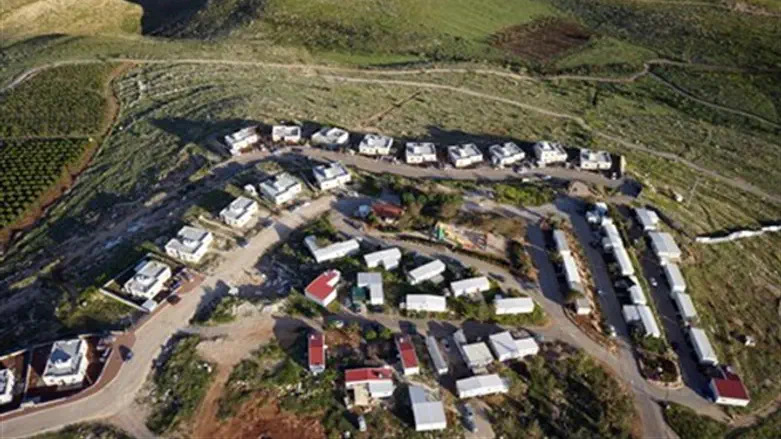
Former defense minister Moshe Ya'alon arrived Monday to testify at the Jerusalem District Court during a hearing held in a claim filed by residents of Mitzpe Kramim against claims of ownership over the land, which was allocated to the residents under orders of the Israeli government in 2000.
Mitzpe Kramim is a community in Binyamin with about 43 families and close to 150 children.
Today there are 16 permanent homes in the town, with the rest of the families living in caravans.
The community was originally part of Kohav Hashahar, and was moved to its current location by the Israeli government itself, after an agreement on outposts was signed by the state under then-Prime Minister Ehud Barak in 1999 and then-Central Command leader Moshe Ya'alon.
However, in 2011, a petition was filed alleging that the community was established on private land, despite the fact that the nature of the land was apparently cleared by the state in signing the 1999 agreement.
In the meantime, the case is pending in the Supreme Court in a state of temporary injunction that results in a de facto freeze on the natural development of the community.
During Monday’s hearing, officials who had formulated the decision to move Mitzpe Kramim to its present location in accordance with the decision of the government of the time testified on behalf of the residents.
Ya'alon, who served as head of Central Command during the signing of the agreement with the residents, gave his opinion on the issue, calling for the community to be legalized.
"In the case of Mitzpe Kramim, there is a governmental responsibility, because the residents came to the land due to to the decision of the prime minister and defense minister, and therefore the site must be legalized," Ya'alon said.
He was followed by other witnesses, including Col. Shlomo Politis, the legal advisor of Central Command at the time, along with other witnesses who defended the state's conduct and declared that Mitzpe Kramim had been relocated to its current location within a legal framework and in accordance with the decision of the political echelon.
During the hearing, which was attended by both representatives of the residents and those of the extreme left, the judge noted to the representative of the State Attorney's Office that the state had not yet formulated and presented its position.
Residents of Mitzpe Kramim said after the hearing, "Despite the attempts by the attorney representing the state to investigate aggressively the representatives of the state themselves who were performing their duty under the guidance of political officials and testified in favor of Mitzpe Kramim, attempts which led even the judge to comment on the manner in which the interrogation was conducted, evidence heard during the hearing manifests solid proof of our rights to the land, as we have claimed for the past six years, during which the community has been frozen due to a Supreme Court order. "
"It is regrettable that the Israeli government and its representative in the State Prosecutor's Office do not take responsibility for past decisions, and do not see public and legal value in the existence of agreements signed in the past.
“Instead, we are forced to hold a separate legal procedure to defend the actions of the state itself. "
The residents of Mitzpe Kramim also said that "we view with severity the lack of good faith on the part of the Israeli government in its handling of Mitzpe Kramim, and demand a very simple thing: Agreements must be kept. The Israeli government and its leaders must not convey to the public the harsh message that agreements are only recommendations. The matter is even more true today after the legislation of the Regulation Law, which has the power to normalize the status of Mitzpe Kramim. "
